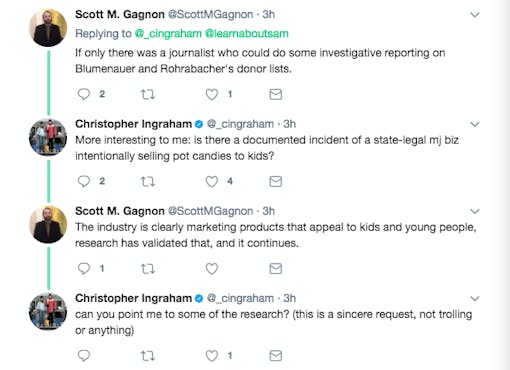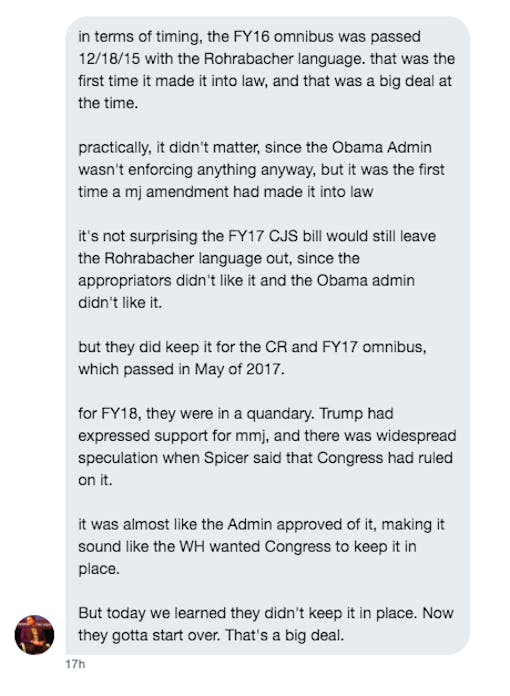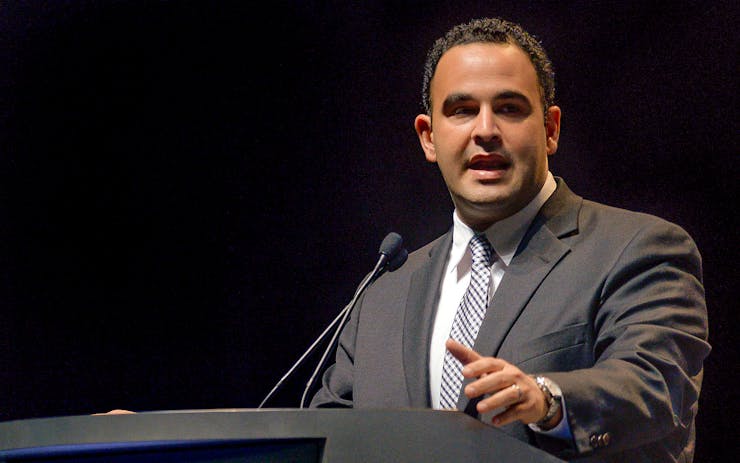On Wednesday evening, one of the nation’s leading anti-cannabis groups issued a press release announcing the “elimination” of a crucial federal protection for state-legal medical cannabis programs. Within hours, however, the group’s announcement had drawn fire from legalization advocates as well as from the so-called Rohrabacher–Blumenauer amendment’s two lead co-sponsors, US Reps. Dana Rohrabacher (R-CA) and Earl Blumenauer (D-OR).
“Marijuana Industry Loses Key Protection from Federal Enforcement in Proposed Spending Bill,” trumpeted Wednesday’s release from the group, Smart Approaches to Marijuana (SAM), which in April submitted testimony to a House subcommittee asking lawmakers to lift the protection.
The group’s leader, Kevin Sabet, then took to Twitter, speculating that “pot investors have to be freaking out” over the apparent development. “It is indeed a new day,” he wrote.
This is of course far from over, but pot investors have to be freaking out. It is indeed a new day.
— Kevin Sabet (@KevinSabet) June 28, 2017
At that point, however, legalization advocates raised a collective eyebrow. Tom Angell, founder of the group Marijuana Majority, responded on Twitter, writing that Sabet and SAM “show extreme ignorance of how Congress works.”
.@kevinsabet@learnaboutsam show extreme ignorance of how Congress works. This amendment is never in base bill; always added with amendment. pic.twitter.com/yMcpxPhvQy
— Tom Angell 🌳📰 (@tomangell) June 28, 2017
Angell argued that the language in the so-called Rohrabacher–Blumenauer amendment, a federal spending provision that prevents the US Department of Justice from using resources to prosecute state-legal cannabis, “is never in [the] base [budget] bill” but is instead added as an amendment. Sabet, he suggested, had made a mountain out of a molehill.
Sabet replied that Angell was “wrong,” noting that the provision seemed to be in the base bill for last year, Fiscal 2017. Angell replied by calling SAM and Sabet “inept.”
From there the Twitter war escalated. Like-minded commenters weighed in.
The Drug Policy Alliance’s Office of National Affairs tweeted that “If only [SAM] had hired an experienced Hill staffer, they wouldn’t make mistakes like this anymore.” Scott M. Gagnon, the leader of SAM’s Maine chapter, tweeted that Angell, a reporter at MassRoots, should “stick to the Kylie Jenner fluff pieces.”
“There is no news here.”
Meanwhile, Leafly reached out to Blumenauer’s office in an effort to figure out what was going on. A spokesperson explained that the cannabis amendment has never been in the base appropriations bill. It only appeared to be in the 2017 base bill because that document was a continuation of the 2016 bill—which had been amended to include the Rohrabacher–Blumenauer (then known as Rohrabacher–Farr) provision.
Less than two hours later, Blumenauer and Rohrabacher issued a joint statement to “rebuke false claims regarding critical medical marijuana protections.”
“The folks at SAM clearly don’t understand the legislative process,” Blumenauer said in a release. “Our amendment has never been in the [subcommittee’s] bill. There is no news here. We are exactly where we thought we would be in the legislative process and look forward to amending the underlying bill once again this year to make sure medical marijuana programs, and the patients who rely on them, are protected.”
On Twitter, he added that “SAM’s complete misrepresentation of the legislative process is entirely consistent with their repeated falsehoods about marijuana.”
SAM’s complete misrepresentation of the legislative process is entirely consistent with their repeated falsehoods about marijuana ….
— Earl Blumenauer (@repblumenauer) June 29, 2017
But Sabet and SAM refused to back down. On Thursday, the group sent another press release claiming that it was the Congressmen who were misrepresenting the situation because they had sent a letter to the House subcommittee asking for the amendment to be included.
“On April 4, Representatives Rohrabacher and Blumenauer, two Members of Congress funded by illegal marijuana operations selling pot candies to kids, wrote appropriators asking to include their pro-marijuana language in a base spending bill—and they expected to get their way,” Sabet said in the release. “Now, like the fox and the sour grapes, they changed their tune once they didn’t get what they wanted.”
(Sabet also sent a Leafly editor more detailed information to support his procedural claims. His comments are included in full at the end of this article.)
Gagnon, of SAM Maine, sent a tweet to Washington Post reporter Christopher Ingraham doubling down on the accusation that Blumenauer and Rohrabacher have profited from illegal cannabis sales to children. Ingraham replied by asking for documented examples—a request neither Gagnon nor SAM has yet responded to.

A Twitter exchange between legalization opponent Scott Gagnon of SAM Maine and Washington Post reporter Christopher Ingraham
Some Congressional observers have noted that it’s not uncommon for officials to send such request letters as formalities, even if they don’t necessarily expect to get what they want. In May, US Attorney General Jeff Sessions sent a letter to congressional leaders asking them to oppose the Rohrabacher–Blumenauer protection.
Outside prohibitionist groups, the letter has largely been met with derision. Even Roger Stone, a longtime confidant to President Donald Trump, said “it’s time for [Trump] to tell Attorney General Sessions to cut the shit.”
For his part, Sabet on Thursday morning seemed chuffed to have irked two members of Congress who have been so central to protecting state-legal cannabis.
“Last night we made 2 Congressmen really mad; they devoted press releases to us,” he wrote on Twitter. “Honored.”
Last night we made 2 Congressmen really mad; they devoted press release to us. 😖🍇
Honored.Full statement here https://t.co/p9EiTrPKSxhttps://t.co/FEVhKemRDB
— Kevin Sabet (@KevinSabet) June 29, 2017

Kevin Sabet messaged a Leafly editor to explain his reading of the history behind the cannabis amendment.





